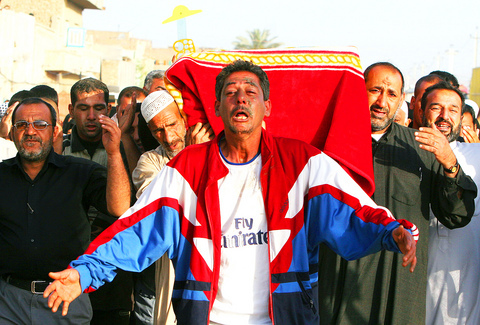Iraqi leaders were yesterday bidding to thwart a potential Shiite backlash against Sunnis a day after an attack in a Baghdad Shiite mosque killed 79 worshippers and revived fears of civil war.
Suicide bombers, at least two of them dressed as women, blew themselves up on Friday in the Barath mosque as they stepped out of the sanctuary after prayers, in one of the biggest attacks against the majority Shiite community.
Thousands of Shiites were gathering in central Baghdad for an address by their powerful leader Abdel Aziz al-Hakim, head of the main Shiite party the Supreme Council of Islamic Revolution in Iraq (SCIRI).

PHOTO: AP
Young men, carrying banners and green flags, were emerging from various streets of Baghdad and flocking towards the office of Hakim, raising slogans against Abu Musab al-Zarqawi, the frontman of al-Qaeda in Iraq.
"No No to Zarqawi," "No No to terrorists" said some of the banners they held.
Hakim had blamed the bombings on forces loyal to the former Iraqi ruler Saddam Hussein.
"These mobs of Saddamists do not care about innocent lives and they are perpetrating genocide against Shiites," he said.
Grief-stricken relatives were taking the bodies of their loved ones from hospitals and heading to the southern Shiite holy city of Najaf for burials.
Fearing possible Shiite reprisals, similar to those after the Feb. 22 bombing of a Samarra shrine, Iraqi and US authorities were on high alert in Baghdad.
The dynamiting of the Shiite shrine in Sammara triggered a wave of Shiite reprisals against Sunnis across Iraq.
Hundreds, mostly Sunni Arabs, died in the ensuing tit-for-tat killings between the two ethnic Muslim groups.
Friday's blasts marked the second major attack on Iraq's dominant Shiite community in as many days and heightened fears that the country was disintegrating into a civil war along religious and ethnic lines.
"This was clearly perpetrated by those who wish to divide Iraq, who wish to encourage sectarian strife. And it was perpetrated by individuals who clearly have no respect for religion," said US State Department spokesman Sean McCormack in Washington.
He said the US government would work with Iraqi authorities to try to "prevent similar types of attack" despite escalating violence against the Shiite community by minority Sunni Muslim extremists.
The attack comes as the US and Britain push Iraq's political leaders to form a national unity government as soon as possible.
Iraqi President Jalal Talabani said the attack was "another attempt to derail the political process and fuel a sectarian conflict."
The US ambassador to Iraq Zalmay Khalilzad urged "all Iraqis to exercise restraint in the wake of this tragedy, to come together to fight terror, to continue to resist the provocation to sectarian violence."
Sunni political and religious associations also condemned the blast.
The attack followed a car bombing on Thursday that killed 10 people in the Shiite shrine city of Najaf and came amid political deadlock as Prime Minister Ibrahim Jaafari refused to back down amid pressure to step down.
Almost four months after its national election, Iraqi leaders have failed to come up with a working cabinet due to bitter wrangling between various parliamentary blocs on ministerial posts and Jaafari's candidacy.

PARLIAMENT CHAOS: Police forcibly removed Brazilian Deputy Glauber Braga after he called the legislation part of a ‘coup offensive’ and occupied the speaker’s chair Brazil’s lower house of Congress early yesterday approved a bill that could slash former Brazilian president Jair Bolsonaro’s prison sentence for plotting a coup, after efforts by a lawmaker to disrupt the proceedings sparked chaos in parliament. Bolsonaro has been serving a 27-year term since last month after his conviction for a scheme to stop Brazilian President Luiz Inacio Lula da Silva from taking office after the 2022 election. Lawmakers had been discussing a bill that would significantly reduce sentences for several crimes, including attempting a coup d’etat — opening up the prospect that Bolsonaro, 70, could have his sentence cut to

China yesterday held a low-key memorial ceremony for the 1937 Nanjing Massacre, with Chinese President Xi Jinping (習近平) not attending, despite a diplomatic crisis between Beijing and Tokyo over Taiwan. Beijing has raged at Tokyo since Japanese Prime Minister Sanae Takaichi last month said that a hypothetical Chinese attack on Taiwan could trigger a military response from Japan. China and Japan have long sparred over their painful history. China consistently reminds its people of the 1937 Nanjing Massacre, in which it says Japanese troops killed 300,000 people in what was then its capital. A post-World War II Allied tribunal put the death toll

A passerby could hear the cacophony from miles away in the Argentine capital, the unmistakable sound of 2,397 dogs barking — and breaking the unofficial world record for the largest-ever gathering of golden retrievers. Excitement pulsed through Bosques de Palermo, a sprawling park in Buenos Aires, as golden retriever-owners from all over Argentina transformed the park’s grassy expanse into a sea of bright yellow fur. Dog owners of all ages, their clothes covered in dog hair and stained with slobber, plopped down on picnic blankets with their beloved goldens to take in the surreal sight of so many other, exceptionally similar-looking ones.

‘UNWAVERING ALLIANCE’: The US Department of State said that China’s actions during military drills with Russia were not conducive to regional peace and stability The US on Tuesday criticized China over alleged radar deployments against Japanese military aircraft during a training exercise last week, while Tokyo and Seoul yesterday scrambled jets after Chinese and Russian military aircraft conducted joint patrols near the two countries. The incidents came after Japanese Prime Minister Sanae Takaichi triggered a dispute with Beijing last month with her remarks on how Tokyo might react to a hypothetical Chinese attack on Taiwan. “China’s actions are not conducive to regional peace and stability,” a US Department of State spokesperson said late on Tuesday, referring to the radar incident. “The US-Japan alliance is stronger and more